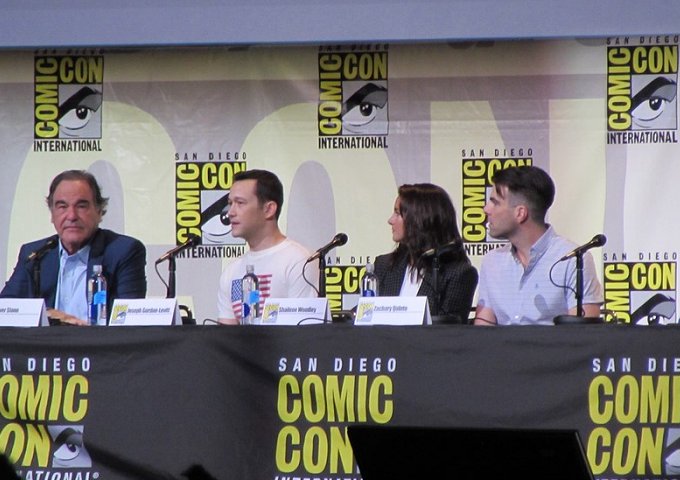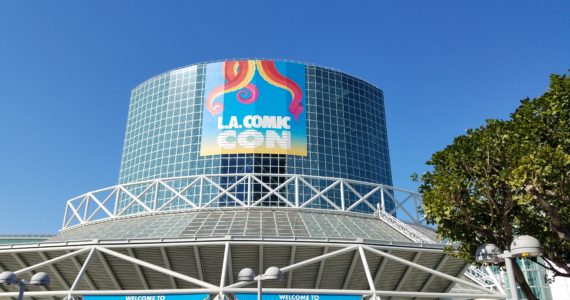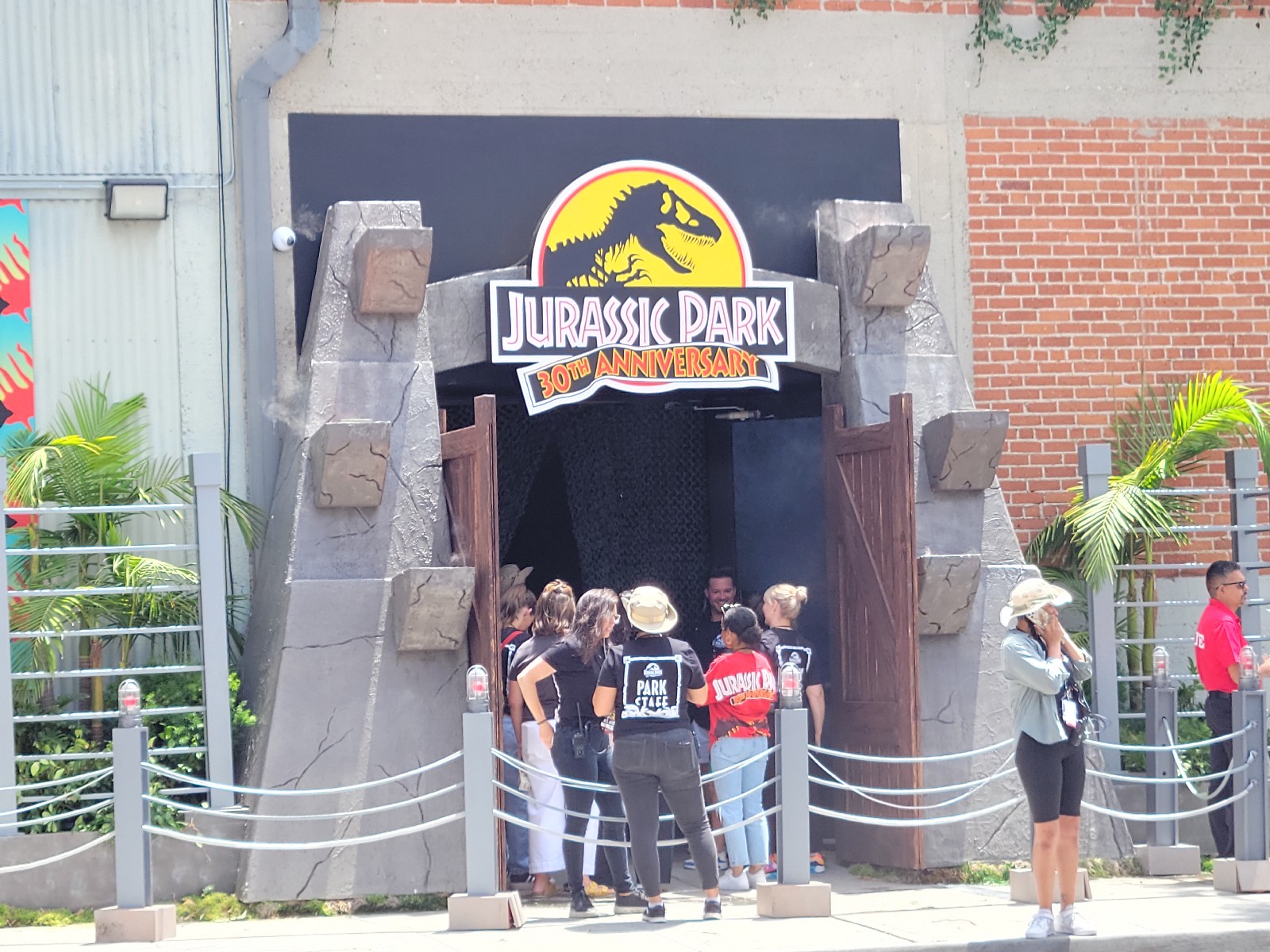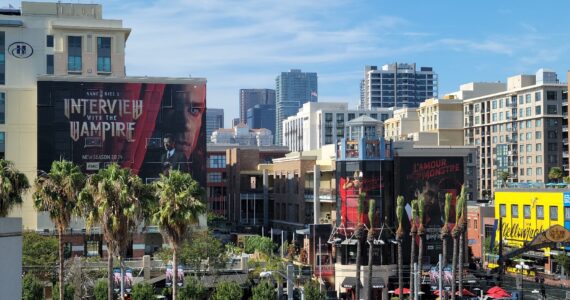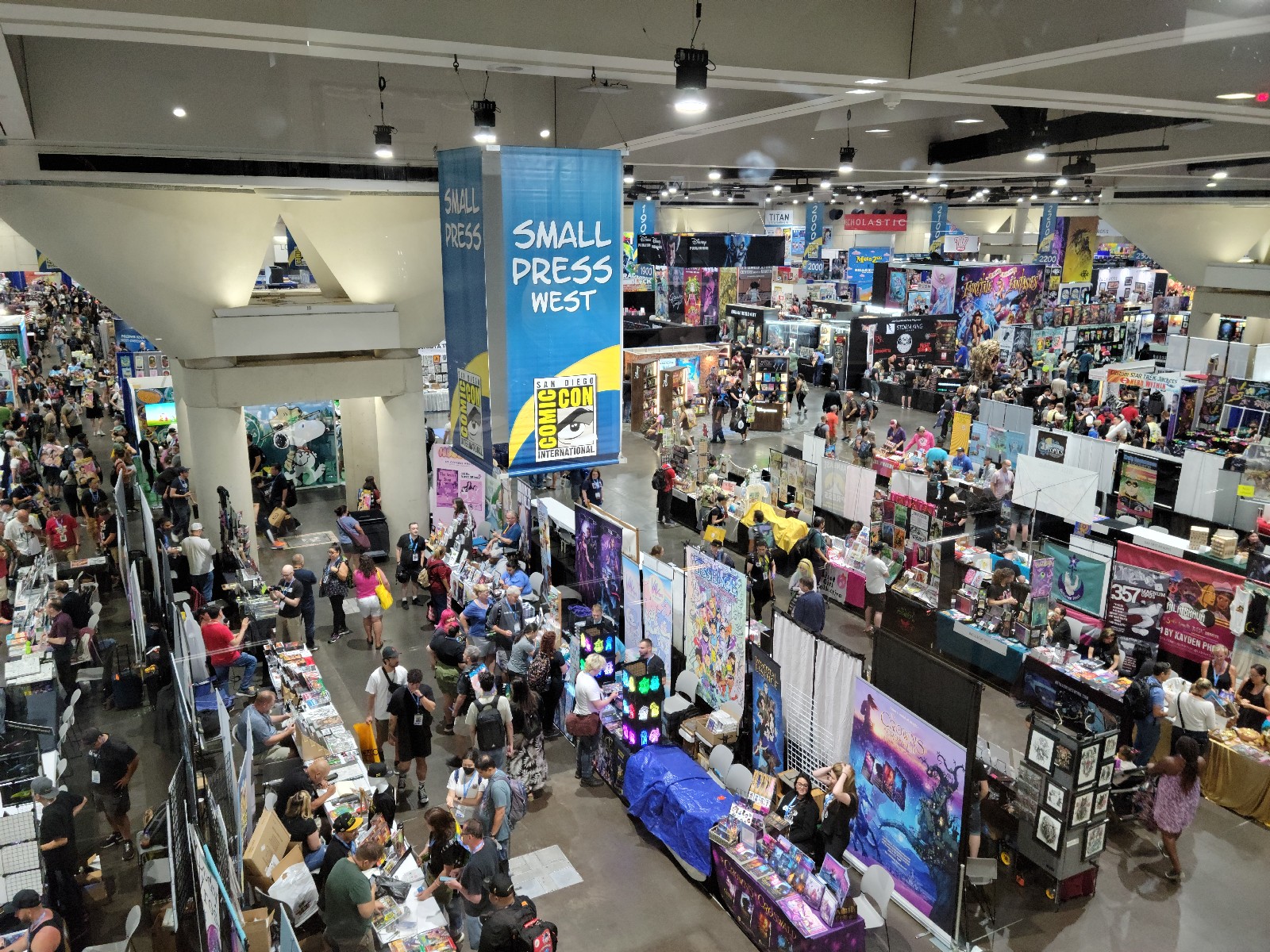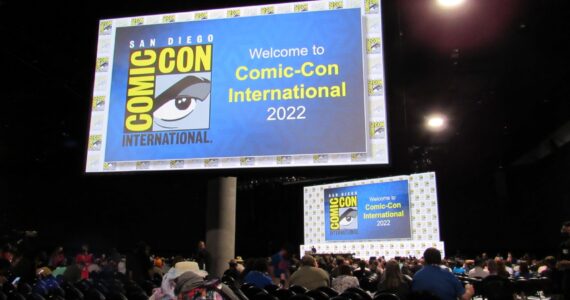The first full panel Violet and I saw at Comic-Con this year was in the legendary Hall H room, and it was the Snowden movie. Thursday was a fairly “light” schedule, so Snowden was a walk-in panel, thankfully, and we were able to walk into the panel before it without any wait. Click here to see our coverage of the previous panel, DreamWorks Animation.
The Snowden panel introduces Oliver Stone by showing a clip of various parodies used in other films/medias, where bits of iconic scenes from his movies have been used in various other movies. We also see some iconic scenes from his movies as well. Oliver Stone then comes out to the crowd, which ushers in a huge round of applause for the legendary director, for whom this is his first appearance at San Diego Comic-Con.
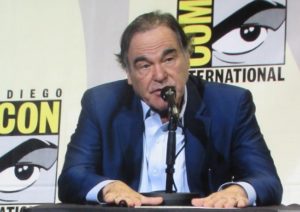 One of the first things Oliver Stone is asked about is his feeling about conspiracy of Snowden. Oliver talks about how Snowden’s story is still affecting us, and it is a widespread problem. This is then followed up with Oliver being asked what he hoped to accomplish with this movie, to which Stone responds saying that he got as much information as they could, and there is still a lot that is not known, given there are many classified documents out there that he obviously doesn’t have access to.
One of the first things Oliver Stone is asked about is his feeling about conspiracy of Snowden. Oliver talks about how Snowden’s story is still affecting us, and it is a widespread problem. This is then followed up with Oliver being asked what he hoped to accomplish with this movie, to which Stone responds saying that he got as much information as they could, and there is still a lot that is not known, given there are many classified documents out there that he obviously doesn’t have access to.
Interestingly, Oliver Stone talks about meeting with Snowden in Moscow, in 2014. Oliver Stone talks about their 3 meetings they had, and how it took a lot to get Snowden to trust him. Stone also commented about the private nature of Snowden, but also said that Stone was a very resolute person, as well as a man who never “wilted”, meaning never gave up on his beliefs.
Stone also talks a lot about the film-making process, and how it took a lot of collaboration and discussion of how the film should be done–all the way through to the editing process. Also, when making this film, Stone talks about some of the troubles with it, one being the inability to get funding for it. US-based production companies were unwilling to fund this movie, due to the sensitive nature of the film. When asked if Oliver thought this was a conspiracy, he replied he didn’t think so, but called it a form of “self-censoring”. Stone is also asked if he thinks the NSA is monitoring his activities. Oliver Stone says he doesn’t think this is the case, but they decided to film the movie in Germany, as they had a very friendly “climate” in terms of filming this movie and what it stood for. Other cast members seemed to echo this sentiment at the panel as well, regarding the NSA’s (lack of) involvement in trying to stop this film. Another point that Oliver Stone seemed to want to make in the panel is that Stone talks about that he doesn’t want to take too much of a side in the film, and there are characters on the government’s side that show their side of the story.
After some chatting, we were shown a second trailer, which shows us similar footage to the first trailer, but adds a bit more to the film. After this trailer, some of the cast of the movie is brought out to join the panel, including Zachary Quinto, Shailene Woodley, and Joseph Gordon-Levitt.
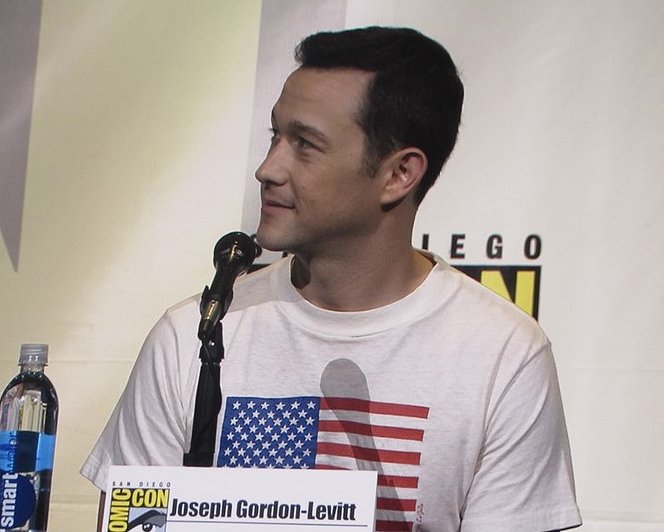 Joseph Gordon-Levitt, who plays Edward Snowden, immediately compliments Oliver Stone on this film, and says that Oliver Stone is the most patriotic filmmaker he has worked with — hence the American flag shirt Levitt is wearing. Levitt also talks about how the nature of this film shows how much he and the cast love America, as this film shows that just because they love America, it doesn’t mean it is perfect, and this film shines the light on some things that need to be fixed.
Joseph Gordon-Levitt, who plays Edward Snowden, immediately compliments Oliver Stone on this film, and says that Oliver Stone is the most patriotic filmmaker he has worked with — hence the American flag shirt Levitt is wearing. Levitt also talks about how the nature of this film shows how much he and the cast love America, as this film shows that just because they love America, it doesn’t mean it is perfect, and this film shines the light on some things that need to be fixed.
Joseph Gordon-Levitt also talks about learning to “be” Snowden, which involved listening to a lot of tapes of Edward Snowden, so that he would be able to get the voice down. Levitt talks about how he had to work on it, and didn’t want to use the Snowden voice until he had it down perfect. Getting a little political, Levitt discusses how he believes that everyone has a right to privacy, as guaranteed by the Constitution (I hate to get political here, and I am not agreeing/disagreeing with the right to privacy, but I don’t believe the Constitution specifically mentions this as a right, but it has been interpreted as being in there by some people much more knowledgeable than myself).
Levitt also talks about how he met Snowden in Moscow, and had a sitdown for several hours with him. They ate together, and Levitt remarked that he feels you can learn a lot about a person by eating a meal with them. Levitt felt that Snowden was a very polite, gentleman of a person, who had a very optimistic outlook on the world, despite what technology is doing to it. When asked if Snowden has commented on Levitt’s performance, Levitt says he hasn’t gotten brave enough to ask yet.
Shailene Woodley, who plays Snowden’s girlfriend, Lindsay Mills, also talks about her political views, and discusses how this film had a “profound impact” on her life, and she found it very relevant to herself. When she discusses meeting Snowden, she says how she met Lindsay, and wish she had met her before the movie was done filming, so she could have gotten nuances of her character more correct. She also talks about how this is the first “real-life” person she has played, and talks about the difficulty of this.
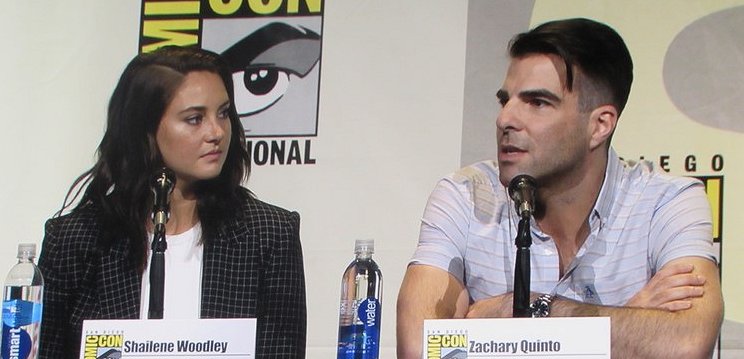 Zachary Quinto talks about the character he plays, Glenn Greenwald, and discusses how powerful and remarkable his character is. He also says, like Levitt, that he had a lot of video tapes he could watch to help himself get into this character. Interestingly, when asked if he had met Snowden, Quinto said he met him before he became the big name he is today.
Zachary Quinto talks about the character he plays, Glenn Greenwald, and discusses how powerful and remarkable his character is. He also says, like Levitt, that he had a lot of video tapes he could watch to help himself get into this character. Interestingly, when asked if he had met Snowden, Quinto said he met him before he became the big name he is today.
Back to Oliver Stone, he talks about how Snowden doesn’t really have any friends other than his girlfriend. Stone is also asked about what he thinks about this movie appealing to a younger audience, and he seems to think the topic is relevant to everyone. Oliver Stone also talks about receiving a letter from Shailene, and he was very grateful having her in this film.
Oliver Stone is also asked about the difference in filming digitally and actual film, and Oliver says that he thinks digital is near the quality of film, but it is not quite there yet. He decided to go digital on this film though.
The actors are then asked if their politics have changed or been solidified after doing this movie, and they seem to all agree it solidified it. Levitt talks about looking into the story himself, and talks about how the Snowden is more complicated than he originally knew. Quinto echoes this sentiment as well.
Of course, Pokemon Go comes up in this panel, and Quinto talks about how he thinks people need to take a break from their smart phones for a while. Stone, meanwhile, seems to dislike Pokemon Go, and discusses Google’s and Pokemon Go’s data-mining for information for making profits. Stone says that these programs actually can change our actions.
This about wrapped up the Snowden panel though, and the end of our adventures in Hall H on Thursday. Violet and I decided to venture outside to get some lunch and take a look around at the offsites, which will be discussed in our next segment of Comic-Con wrap up! Click here to see photos of various offsites and for our recap of Marvel’s Luke Cage panel!
Comic-Con was nice enough to release the footage of the new trailer for Snowden, which you can check out here:
See below for more photos from the “Snowden” panel!

